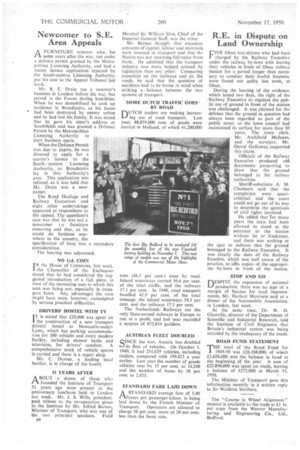Newcomer to S. E. Area Appeals
Page 42

If you've noticed an error in this article please click here to report it so we can fix it.
A FURNITURE remover who, for Pi some years after the war, ran under a defence permit granted by the Metropolitan Licensing Authority, and had a recent licence application rejected by the South-eastern Licensing Authority, put his case to the Appeal Tribunal last week,
Mr. R. E. Drain ran a remover's business in London before the war, but served in the Forces during hostilities. When he was demobilized he took up residence in Broadstairs, as his home • had been destroyed by enemy action and he had lost his family. It was stated that he gave his sister's address at Southfields and was granted a Defence Permit by the Metropolitan Licensing Authority to start business again.
When the Defence Permit was due to expire, he was directed to apply for a carrier's licence to the South eastern Licensing Authority, as Broadstairs lay in that Authority's area. This application was refused, as it was held that Mr. Drain was a newcomer.
The Road Haulage and Railway Executives and eight other undertakings appeared as respondents to the appeal The appellant's case was that he was not a newcomer t o furniture removing and that, as he could do business anywhere in the country, the specification of base was a consideration.
The hearing was adjourned. secondary NO lid. COIN I N the House of Commons, last week.
the Chancellor of the Exchequer stated that he had considered the suggested introduction of a lid. piece, in view of the increasing uses to which this sum was being put. especially in transport fares. Any advantages the coin might have were, however, outweighed by serious practical difficulties.
DRIVERS' HOSTEL WITH TV IT is stated that £20,000 was spent on the construction of a new transport drivers' hostel at Newcastle-underLyme, which has parking accommodation for 300 vehicles and every modern facility, including shower baths and television, for drivers' comfort. A comprehensive stock of vehicle spares is carried and there is a repair shop.
Mr. C. Durose, a leading local haulier, is in charge of the hostel.
31 YEARS AFTER
ABouT a dozen of those who founded the Institute of Transport 31 years ago were present at the anniversary luncheon held in London last week. Mr. 3. S. Wills, president, paid tribute to the co-operation given to the Institute by Mr. Alfred Barnes, Minister of Transport, who was one of the two principal speakers. Field
a8
Marshal Sir William Slim, Chief of the Imperial General Staff, was the other.
Mr. Barnes thought that excessive amounts of capital, labour and materials were invested in transport and that the Nation was not receiving full value from them. He admitted that the transport industry was more hedged around by legislation than any other. Comparing casualties on the railways and on the roads, he said that the question of accidents had to be borne in mind when striking a • balance between the two systems of transport.
MORE DUTCH TRAFFIC GOES BY ROAD
nUTCH traders are making increasing use of road transport. Last year, 88,859,000 tons of goods were carried in Holland, of which 41,200,000
tons (46.3 per cent.) went by road. Inland waterways carried 36.6 per cent. of the total traffic, and the railways 17.1 per cent. In 1948, road transport handled 42.9 per cent, of the total tonnage, the inland waterways 39.3 per cent. and the railways 17.3 per cent.
The Netherlands Railways are the only State-owned railways in Europe to run at a profit, and last year recorded a surplus of 872,834 guilders.
AUSTRIA'S FLEET DOUBLED
S1NCE the War, Austria has doubted Oils fleet of vehicles. On October 1, 1949, it had 251,629 vehicles, including trailers, compared with 199,423 a year earlier. Last year the number of goods vehicles rose by 15 per cent. to 14,248 and the number of buses by 38 per cent. to 2,655.
STANDARD FARE LAID DOWN
A STANDARD average fare of 3.40 4—tfrarics per passenger-kilom. is being laid down by the French Minister of
Transport. Operators are allowed to charge 10 per cent. more or 20 per cent, less than the basic rate.




























































































